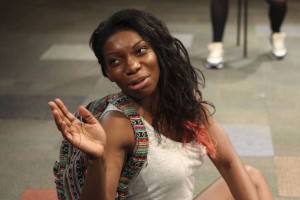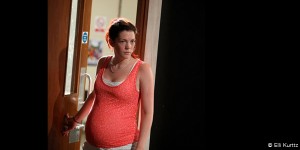From your mouth to the director’s ear – that has been one idea of verbatim theatre. Using the words, experiences and sometimes the very inflections of interviewees as the basis for a production, verbatim has often seem to offer theatre a bracing hit of ‘pure’ reality, a window into authentic documentary material.
But like all theatrical forms, verbatim is a shape-shifting beast. Last night I caught up with a fantastic piece at the National Theatre’s Shed, its small red cube of sparky doings. Home is based on interviews with residents at an east London hostel for young people, and weaves the words of single mothers, refugees, teenagers booted out by their parents, and the staff who support them. You might expect gritty documentary – but the spoken segments swerved with glorious unpredictability into song: rap, soul, heartfelt r’n’b. One of the actors – the beatboxer Grace Savage – didn’t say a word, but let her awesome larynx squiggle and sputter through the show, like an uncannily responsive radio.
Home is a location, and more importantly an idea. All the interviewees are frank – they’re grateful for the hostel as the place of last resort, but none of them quite considers it home. They tell you what has brought them there, and where they hope to reach. You could present their reflections in a journalistic style – as depositions as much as drama – but director Nadia Fall wants you to feel with them, not for them. As soon as a melody launches – lightly accompanied by a busker on guitar – the mood expands with the characters’ fears and longings. As assistant dramaturge Rob Drummer writes in an invaluable background pack, the ‘music, sound and even movement… lift the work, give time to reflect.’ It also helped the creative team resolve what ‘is always the crux, the heat of working with verbatim material: how do you treat it with respect whilst also building a theatrical experience that transcends the text?’
(Fall, by the way, is undoubtedly a director to keep an eye on. In the past year or so, I’ve seen three of her productions, each utterly absorbing and utterly distinct: Home follows a sumptuously entertaining The Doctor’s Dilemma by Shaw at the National, and the British premiere of Ayad Akhtar’s Pulitzer-winning The Disgraced at the Bush. What links them is an ability to make ideas engaging, to help you feel the blood pulse through argument).
Earlier this year, the reliably thought provoking Andrew Haydon wrote an interesting piece on stage design, wondering about a prevalent mode of British theatre, which often uses both naturalistic trappings in an overtly theatricalised space. What to call ‘the style with no name’, he wondered – and came up with ‘naturalism and…’ or ‘naturalism but…’ History may supply a snappier label, but for now this is spot-on – I’ve had Haydon’s terms in my head ever since I read them.
Verbatim theatre might seem to nail you to naturalism, but theatre-makers play with the possibilities of the form. Those authentic words and experiences, it seems, can both anchor a show and let it fly. Verbatim (or, as Haydon might say, verbatim-but, verbatim-and) productions have been among the most revealingly theatrical of recent years. I’m still floored by the way Alecky Blythe and Adam Cork made a musical from a community piecing itself together in London Road. Chris Goode’s marvellous Monkey Bars corkscrewed into my heart with its children’s words voiced by wrong-footed adults. The Riots was a more conventional post-mortem of the events that rattled London in 2011, but the impassioned, snaking discussion that followed exemplified a new form – public inquiry and public forum combined.
But let’s end with the heart-tugging moments when Home settles into song, and gives voice to the yearning and sorrows that our daily prose keeps at bay. It’s a commonplace to credit the internet with changing our notion of reality, but of course there’s always been more to reality than reality. Thoughts and feelings are as real to us – more real – than simply the nubble of circumstance – and theatre keeps finding new ways to capture it.
Follow David at @mrdavidjays



Leave a Reply